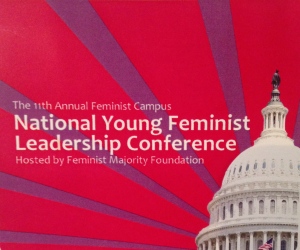Just like many other writers for ShoutOut, I too went to the National Young Feminist Leadership Conference last weekend. I can honestly say that I have never been anything so incredible and life changing in my life. While at the conference, the eight ShoutOut representatives all tried to attend different workshops to write about. In addition to writing for ShoutOut I also work for the JMU LGBT&Ally Education Program, so many of the workshops I attended focused heavily on the Queer community, and the intersectionality and inclusivity of feminism and LGBTQ* campus affiliates. In addition to seeing Kimberele Crenshaw (the incredible woman who coined the term intersectionality,) I was able to learn a great deal about the history of feminism, in which I am ashamed to say I was lacking in, and how the fight for equality is for a fight by all for all.

The history of feminism and therefore feminist politics is often talked of as consisting of three separate but important waves. First-wave feminism is mostly associated with the women’s suffrage movements of the late nineteenth and early twentieth centuries. This was a turning point in history because it was the first time that women’s actions had an impact of the government. These issues ere brought to light and they include but are not limited to the legal barring of women from voting, reduced property rights, lack of employment that wasn’t completely gendered, unequal rights in marriage, and a severe lack of positions of political power and authority.
Second-wave feminism is often associated with the liberation movements regarding women that took place in the 1960s and 1970s. While seeing themselves as inheritors of the politics of the first wave which focused primarily on legal obstacles to women’s rights, second-wave feminists began focusing on more centered issues that affected women; these include gender equality, and addressed issues like sexuality, reproductive rights, women’s roles and labor in the home, and patriarchal culture.
Finally, what is called third-wave feminism is generally associated with feminist movement that began in the 1980s and continues on through today. Third-wave feminism took form out of people who disagreed with the lack of inclusivity within the issue based second wave of feminism. Many feminists felt that the earlier generation of feminists had over-generalized the experiences of white, middle-class, heterosexual women and completely ignored women of color, the poor, LGBTQ* people, and women from the non-Western world. Third-wave feminists focus primarily on issues of racism, and homophobia as part of their feminist agenda.

So, while attending this conference, I learned that currently we are in a society that has an uphill struggle for third wave feminism. This was ever so prevalent with the Twitter trolls that were tweeting rude and truly obscene things about the conference and attempting to turn the #NYFLC2015 hashtag into a negative connotation against feminism. Good news is that it seriously did not work. But this did teach me something about the importance of intersectionality that I had never thought about. I learned that equality is something that we all need to work on. We can’t possibly achieve a society where everyone is equal until we realize that we need to stop stepping over everyone to get there. Our ancestors and the feminists that came before us laid down and incredible groundbreaking path for us, it is our job to take it and expand it.

Great post! I agree that it’s super important to emphasize that we are still working on these issues in the third wave feminist movement because so many people think that the battle has been won, and they are wrong. Feminists have accomplished so much for us, but we still have more to do. “A fight by all for all” is a really good phrase to use when describing feminism that I haven’t heard before! I definitely agree that we are all about intersectionality right now and working on equality for EVERYONE.
LikeLike
Thanks @lumpyspaceproblems! Intersectionality proves that we are all involved in achieving equality for all!
LikeLike
Something that came up a few times at this conference, as well as the Sociology (gender focused) conference I attended last week, was the idea of third-wave feminism and “neoliberalism”. Another Shoutout blogger and I were sort of confused about this term at first, so I was wondering if you’ve ever encountered it or had a general opinion about the whole “neoliberalism” movement?
LikeLike
I have to say, I have never heard the term “neoliberalism” in regards to feminism. I have heard it referring to economics, so I’m totally going to do some more research. Thanks for bringing it up @manganea
LikeLike